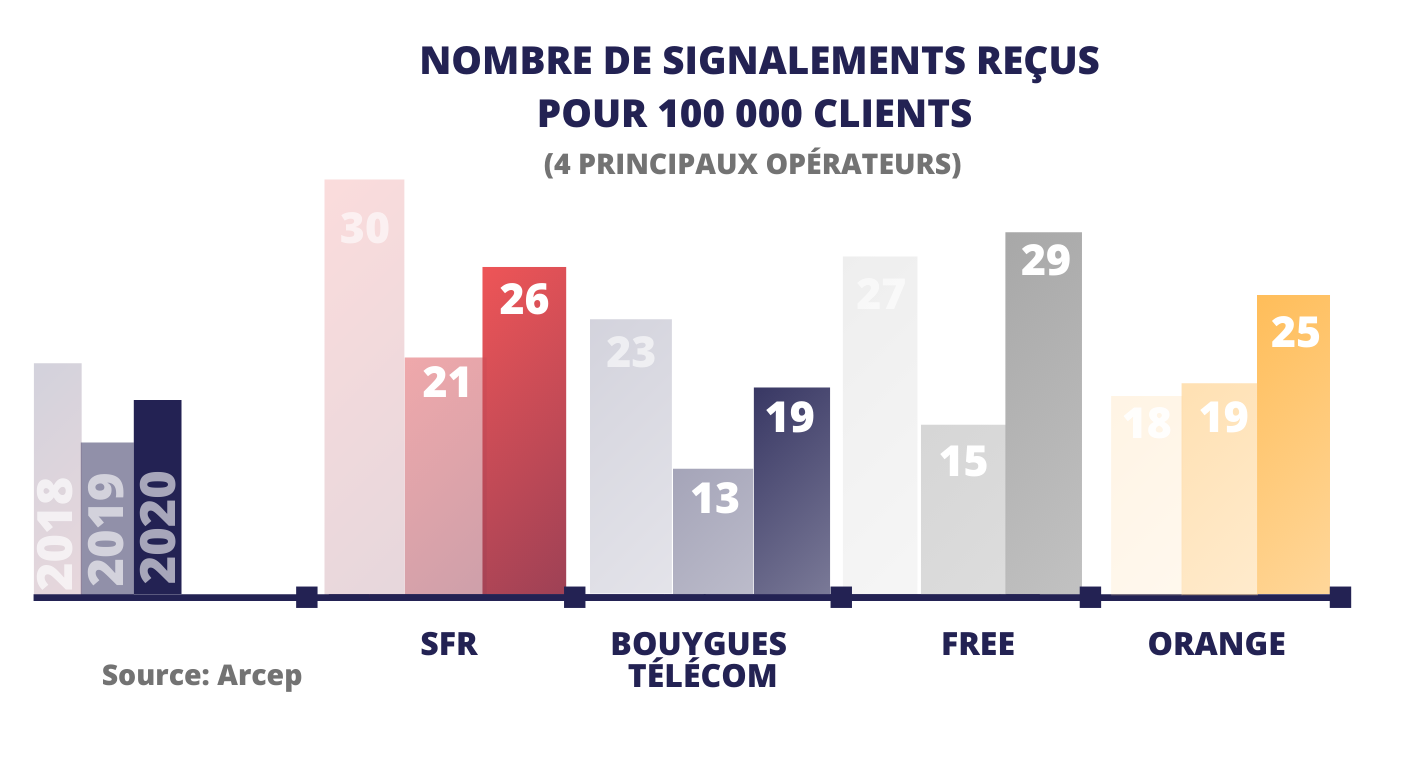Launched in 2017, then upgraded in 2020, the “J’alerte l’Arcep” platform allows any user – be they individuals, businesses, local authorities, developers or consumer associations – to report any malfunctions encountered in their relationship with their mobile operator, internet service provider, and postal service or press distribution providers. Today, Arcep is publishing a summary of the reports received in 2020, and the main lessons to be drawn from them.
The number of reports received increased by 37% in 2020, and operator rankings in number of alerts changed
In 2020, Arcep received more than 33,000 reports, including 27,000 directly on the platform – the remaining alerts being received through other channels (email, the post, phone calls). This sizeable increase (+37% YoY) is due in large part to a rise in reports of fixed internet malfunctions, which took on a new dimension during the Covid-19 crisis and the widespread adoption of remote working.
Operator rankings in terms of number of reports differed from 2019. Bouygues is the operator for which the number of complaints, proportionate to the size of its customer base, was the lowest. Free saw its complaint numbers increase, and became the operator with the highest number of reports received per 100,000 customers in 2020.
Users’ overall satisfaction with their operator down slightly
As it does every year, Arcep compared the alerts it received on the “J’alerte l’Arcep” platform with a survey conducted by Ifop. This survey polled a sample of 4,010 people who are representative of the French population, and who have internet access and a mobile phone. The lessons drawn from “J’alerte l’Arcep” largely align with the survey’s findings – particularly the fact that users’ average level of satisfaction, scored from 1 to 10, dropped from 7.65 in 2019 to 7.5 in 2020.
The Covid-19 crisis and the lockdowns affected the reports received and the regulator’s actions
Arcep was fully committed to managing the impact of the Covid-19 crisis on behalf of consumers. In particular, it relayed alerts received from groups that had been deemed top priority (healthcare workers, essential businesses, local authorities, etc.) so that operators might provide them with a rapid response. The Authority was also especially vigilant in addressing issues tied to the public health crisis (roaming for consumers who were blocked overseas, quality of the La Poste services, etc.).
Analysing these reports enabled Arcep to investigate several concrete cases and, depending on the issues encountered, to make use of the different levers at its disposal: from issuing a caution, up to instigating formal procedures against the operators in question for situations that warranted it.
In several instances, the alerts received enabled Arcep to liaise with the operators in question in real time, and find a rapid solution. One example: following several surges in alerts on the quality of last mile fibre connections in specific locations, Arcep contacted the infrastructure operators concerned, to better understand cases of so-called “non standard” connection, and identify ways to improve them.
A year marked by reports on the quality of postal distribution
In the postal market, last year was marked by a substantial number of alerts regarding the quality of postal distribution, which was heavily affected by the Covid-19 crisis, especially during the first lockdown in March 2020. Arcep became involved in the matter, and issued an opinion at the Government’s behest on the organisation that La Poste put into place to handle the Covid crisis, which led La Poste to improve its reactivity in light of the circumstances, and to improve the information provided to users and elected officials.
Arcep receives its first reports from newsagents
In late 2019, Arcep was assigned a newfound responsibility: to regulate print media distribution. In November 2020, a new section was opened on “J’alerte l’Arcep” to allow the sector’s players, and particularly newsagents and publishers, to make use of this tool. Newsagents were quick to adopt the platform, using it to report several issues to Arcep regarding the conditions governing the access to press titles not registered with France’s Joint Commission for Press Publications and Agencies (CPPAP), as a result of which Arcep initiated a dialogue on the matter with press distributors.
J’alerte l’Arcep and data-driven regulation Launched in October 2017, the “J’alerte l’Arcep” platform is an integral part of the Authority’s data-driven approach to regulation, designed to empower users to make informed choices and help steer the market in the right direction:
Arcep drew on three years of experience and hindsight to improve and enrich its reporting platform’s design and operation in November 2020. This included three major changes:
Arcep has been tasked with regulating the press distribution sector since October 2019. This sector was incorporated into the Authority’s reporting platform in the same way as the telecoms and postal markets. Since November 2020, app developers, telecoms operators and consumer associations have all been able to file reports via this tool.
The pathway for filing a report was revised to make the process smoother.
The internal tool used to relay alerts to Arcep departments in real time was given a complete redesign in November 2020. |

